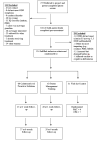Change in Maternal Stress for Families in Treatment for their Children with Oppositional Defiant Disorder
- PMID: 30294196
- PMCID: PMC6171367
- DOI: 10.1007/s10826-018-1089-1
Change in Maternal Stress for Families in Treatment for their Children with Oppositional Defiant Disorder
Abstract
Our objective was to predict change in maternal stress over the course of a randomized clinical trial comparing the efficacy of two interventions for Oppositional Defiant Disorder (ODD): Parent Management Training and Collaborative & Proactive Solutions. In a secondary analysis of data collected from this randomized clinical trial, we examined whether children's self-reported positive relations with their parents impacted responsiveness to treatment, which in turn impacted maternal stress. One hundred thirty-four children and their parents (38.1% female, ages 7-14, M age = 9.51, SD = 1.77) were tracked across three time points: pre-treatment; one-week post-treatment; and six-month post-treatment. Hierarchical linear models tested change in children's reports of positive relations with parents, clinician reports of ODD severity, and maternal reports of parenting stress. Models then tested multilevel mediation from positive relations with parents, through ODD severity, onto maternal stress. Hypothesized indirect effects were supported such that children's reports of positive views toward parents uniquely predicted reductions in ODD severity over time, which in turn uniquely predicted reductions in maternal stress. Results highlight the promise of potential secondary benefits for parents following interventions for children with oppositional problems. Furthermore, results underscore the importance of the parent-child relationship as both a protective factor and as an additional target to complement interventions for child disruptive behaviors.
Keywords: maternal stress; oppositional defiant disorder; parent-child relationship.
Conflict of interest statement
Conflict of Interest Statement RWG: Received royalties related to work concerning Collaborative and Proactive Solutions. The remaining authors have no conflicts of interest.
Figures
Similar articles
-
Perceived Parent-Child Relations, Conduct Problems, and Clinical Improvement Following the Treatment of Oppositional Defiant Disorder.J Child Fam Stud. 2016 May;25(5):1623-1633. doi: 10.1007/s10826-015-0323-3. Epub 2015 Nov 24. J Child Fam Stud. 2016. PMID: 27284234 Free PMC article.
-
Children's oppositional defiant disorder symptoms make parents difficult to be nice: Longitudinal association among parent emotion regulation, child emotion regulation and children's oppositional defiant disorder symptoms in Chinese children with oppositional defiant disorder.Clin Child Psychol Psychiatry. 2022 Oct;27(4):1155-1169. doi: 10.1177/13591045211055822. Epub 2021 Dec 29. Clin Child Psychol Psychiatry. 2022. PMID: 34965152
-
Longitudinal linkages between parenting stress and oppositional defiant disorder (ODD) symptoms among Chinese children with ODD.J Fam Psychol. 2018 Dec;32(8):1078-1086. doi: 10.1037/fam0000466. Epub 2018 Oct 15. J Fam Psychol. 2018. PMID: 30321015
-
Parenting Stress and Depressive Symptoms Among Chinese Parents of Children With and Without Oppositional Defiant Disorder: A Three-Wave Longitudinal Study.Child Psychiatry Hum Dev. 2020 Dec;51(6):855-867. doi: 10.1007/s10578-020-00974-x. Child Psychiatry Hum Dev. 2020. PMID: 32212023
-
Oppositional defiant disorder: Evidence-based review of behavioral treatment programs.Ann Clin Psychiatry. 2022 Feb;34(1):44-58. doi: 10.12788/acp.0056. Ann Clin Psychiatry. 2022. PMID: 35166664 Review.
Cited by
-
Parenting Stress during Late Adolescence in Mothers of Individuals with ADHD with and without ODD.J Child Fam Stud. 2021 Dec;30(12):2966-2979. doi: 10.1007/s10826-021-02131-x. Epub 2021 Oct 23. J Child Fam Stud. 2021. PMID: 35755320 Free PMC article.
-
Sleep problems and parental stress among caregivers of children and adolescents enrolled in a digital mental health intervention.Front Child Adolesc Psychiatry. 2023 Oct 6;2:1265095. doi: 10.3389/frcha.2023.1265095. eCollection 2023. Front Child Adolesc Psychiatry. 2023. PMID: 39816884 Free PMC article.
-
The Parent-Child Relationship and Posttreatment Child Outcomes Across Two Treatments for Oppositional Defiant Disorder.J Clin Child Adolesc Psychol. 2020 May-Jun;49(3):405-419. doi: 10.1080/15374416.2018.1555761. Epub 2019 Feb 7. J Clin Child Adolesc Psychol. 2020. PMID: 30730774 Free PMC article. Clinical Trial.
-
Parent- and Child-Factors in Specific Phobias: The Interplay of Overprotection and Negative Affectivity.J Abnorm Child Psychol. 2020 Oct;48(10):1291-1302. doi: 10.1007/s10802-020-00662-3. J Abnorm Child Psychol. 2020. PMID: 32623544 Free PMC article.
-
Collaborative & Proactive Solutions (CPS): A Review of Research Findings in Families, Schools, and Treatment Facilities.Clin Child Fam Psychol Rev. 2019 Dec;22(4):549-561. doi: 10.1007/s10567-019-00295-z. Clin Child Fam Psychol Rev. 2019. PMID: 31240487 Review.
References
-
- Abidin RR. Parenting stress index-short form. Charlottesville, VA: Pediatric Psychology Press; 1995.
-
- American Psychiatric Association. Diagnostic and statistical manual of mental disorders: DSM-5. Washington, D.C: American Psychiatric Association; 2013.
-
- Anderson SR, Ollendick TH. Diagnosing oppositional defiant disorder using the anxiety disorders interview schedule for DSM-IV: Parent version and the diagnostic interview schedule for children. Journal of Psychopathology and Behavioral Assessment. 2012;34:467–475.
-
- Anthony LG, Anthony BJ, Glanville DN, Naiman DQ, Waanders C, Shaffer S. The relationships between parenting stress, parenting behaviour and preschoolers' social competence and behaviour problems in the classroom. Infant and Child Development. 2005;14:133–154. doi: 10.1002/icd.385. - DOI
-
- Barkley RA. Defiant children: A clinician’s manual for parent training. 2. New York: Guilford Press; 1997.
Grants and funding
LinkOut - more resources
Full Text Sources

